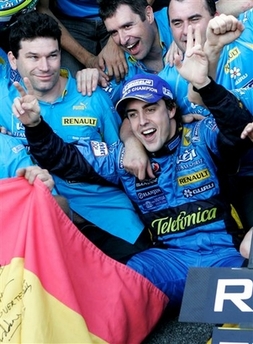Highlights
Double champion Alonso on road to greatness
(Reuters)
Updated: 2006-10-23 11:17
 |
Large Medium Small |
SAO PAULO - Fernando Alonso is on the road to greatness. He may not be there yet, but the destination is not far off.
 Renault Formula 1 driver Fernando Alonso celebrates with the team after winning the driver's championship at the Interlagos racetrack in Sao Paulo, Brazil, on Sunday, Oct. 22, 2006. [Reuters] |
When Alonso won his second successive Formula One title on Sunday, with second place in the Brazilian Grand Prix, an invisible baton passed between departing Ferrari great Michael Schumacher and the 25-year-old Renault driver.
Formula One's most successful champion said farewell, ending an extraordinary era in the sport's history, and handed over to the youngest.
Alonso takes over from Schumacher, retiring after 91 wins and 250 races and with a string of records that may never be broken, as the youngest double champion.
In so doing, the Spaniard joins an elite that includes Juan Manuel Fangio, Ayrton Senna and Alain Prost as one of just eight drivers to win back-to-back titles.
Alonso, as fierce and aggressive on the track as he is soft-spoken and diffident off it, looks more and more like the face of a fascinating future -- even if his move to McLaren next season adds an element of uncertainty.
"He has that fire in his belly. It's too early to call him legendary but he has that shine to him," said 1996 world champion Damon Hill. "He certainly has the ability.
"He's exceptionally good, no question about it. What marks him out is he very clearly has an enormous amount of fight in him. He just does not let things overwhelm him.
"I like Alonso's style. Watching him drive gives me a buzz. He's got a little bit of the Nigel Mansell about him," the Briton told the BBC.
MAGIC TOUCH
The only Spaniard to win a grand prix, let alone a championship, Alonso has always had the magic touch.
He loves to entertain friends and family with card tricks and sleight-of-hand, is an accomplished mimic and a passionate Real Madrid soccer supporter.
There is nothing flash or brash about the softly-spoken Spaniard, who lives in the English university town of Oxford to be near his team and escape the media spotlight at home.
Alonso won seven times last year, and seven more this season. That much remains the same, but in other ways he has changed.
He has been dating a Spanish pop star and has become more outspoken as well as more of a leader.
Last month he was elected by his peers as one of the directors of the Grand Prix Drivers Association, an organisation he had previously shown little inclination to get involved with.
His public utterances have become sharper. Gone are the mumbled platitudes, the reluctance to speak out.
In Monza, last month, he declared Formula One no longer a sport after being penalised harshly by race stewards for allegedly impeding Ferrari's Felipe Massa in qualifying.
He has complained of feeling alone at times at Renault.
"He has made his determination apparent in his reactions to some of the things he sees as injustice. That sort of brings out what Alonso is all about," said Hill.
"There is also a sense of honour with Alonso. I think there is a way in which he wants to win, which is as important to him as winning, and that was manifestly apparent with his reaction to what happened to him in Monza, when he felt he'd been unjustly treated."
ALONSO-MANIA
Much as Michael Schumacher triggered Schumi-mania in Germany, a tap that will now be turned off, Alonso has awakened Spain to Formula One.
Managed by Italian Flavio Briatore, the Renault team boss who oversaw Schumacher's first two titles with Benetton in 1994 and 1995, Alonso is also older than his years.
He instigated his move to McLaren behind Briatore's back last December.
Despite that decision, triggered by uncertainty about Renault's future as well as a huge increase in salary, there has been no loss of focus.
His maturity and confidence should come as no surprise. For all his youth, Alonso has far more experience of racing than many older rivals.
From an unglamorous background in northern Spain's Asturias region, with his father employed as an explosives expert in the mining industry and mother working in a department store, the champion's career started at the age of three.
His father had made a kart for Alonso's older sister, which she spurned, and by the age of 13 Fernando was a Spanish champion.
The world junior kart title followed and in 2000, while competing in the junior and now-defunct F3000 series, he became Minardi's test driver. He made his F1 debut with them in 2001.
In 2003, with Renault, he became the youngest driver to start a grand prix on pole position and the youngest race winner.
Yet, as a boy, grand prix racing was barely on his radar. Spanish television showed only occasional highlights and motorcycling was far more popular. Schumacher was not even a face, just a name.
"I am just a normal guy," Alonso said last season. "I was never totally obsessed with making it to Formula One. For me, this is a job like any other -- it has its own pressures and restrictions.
"Of course, it brings its own privileges too."